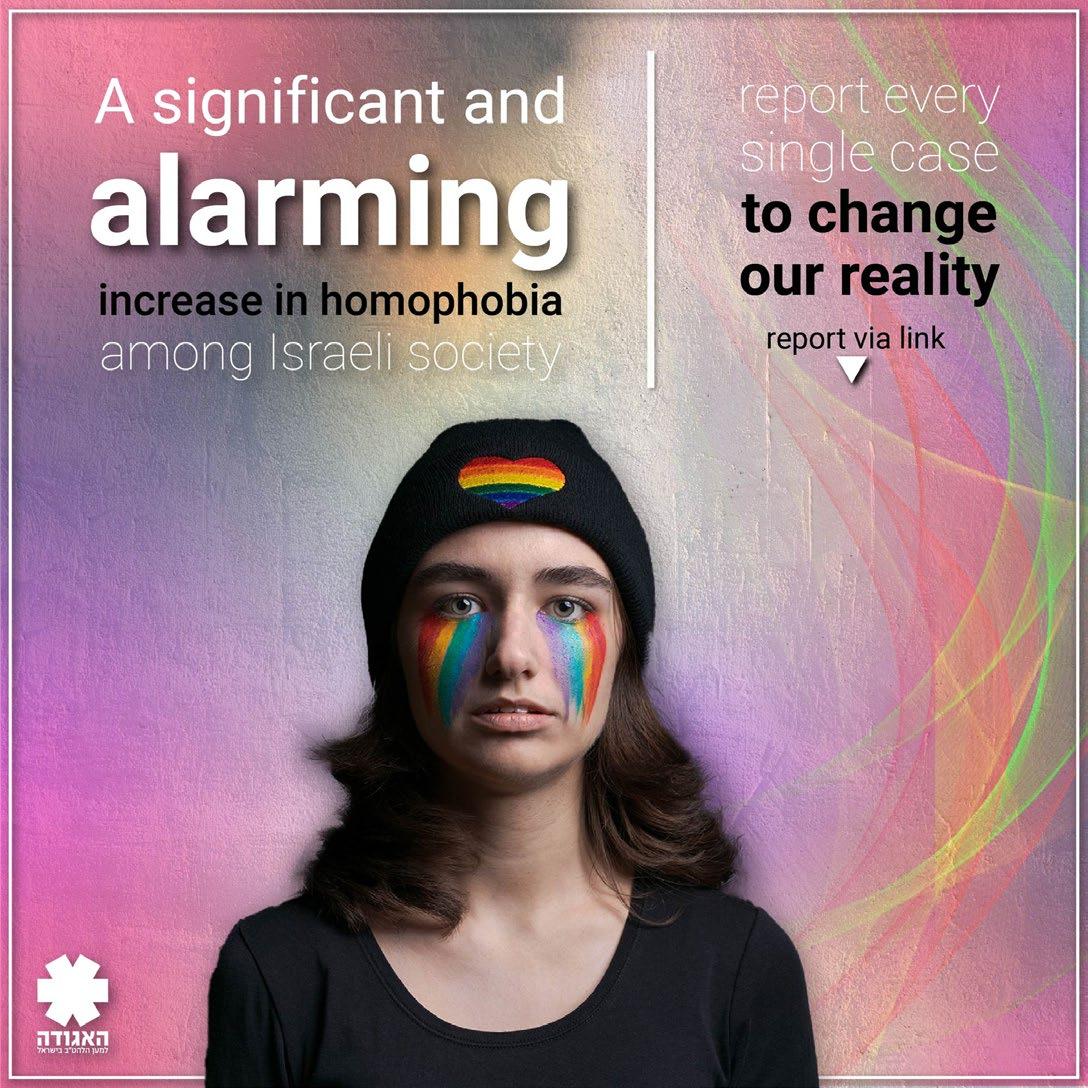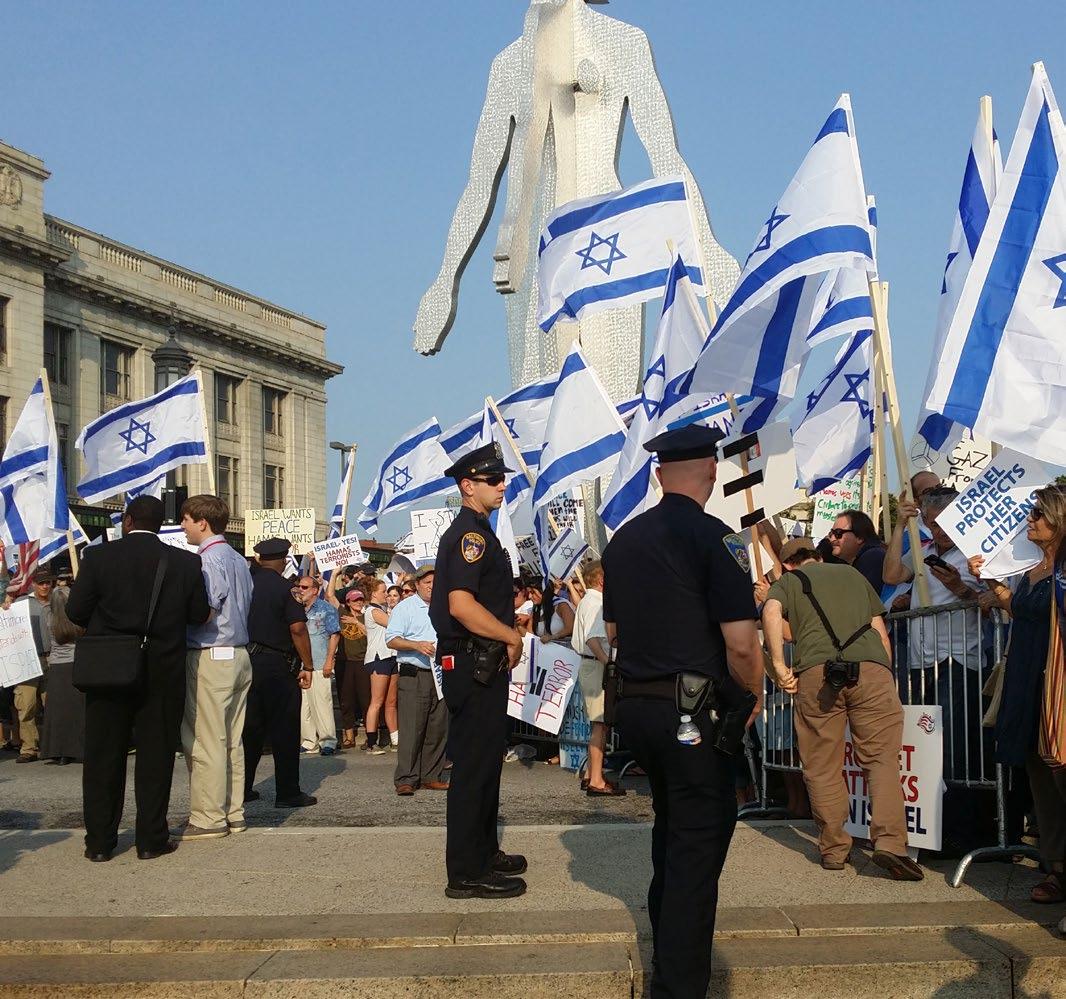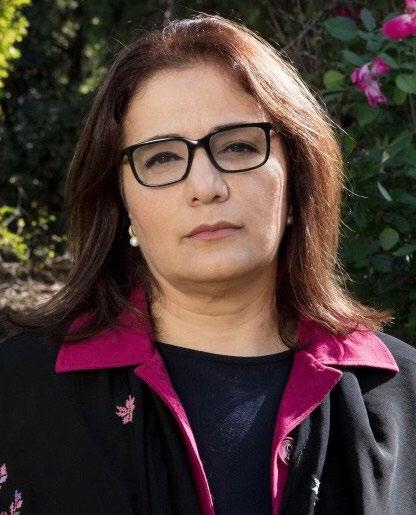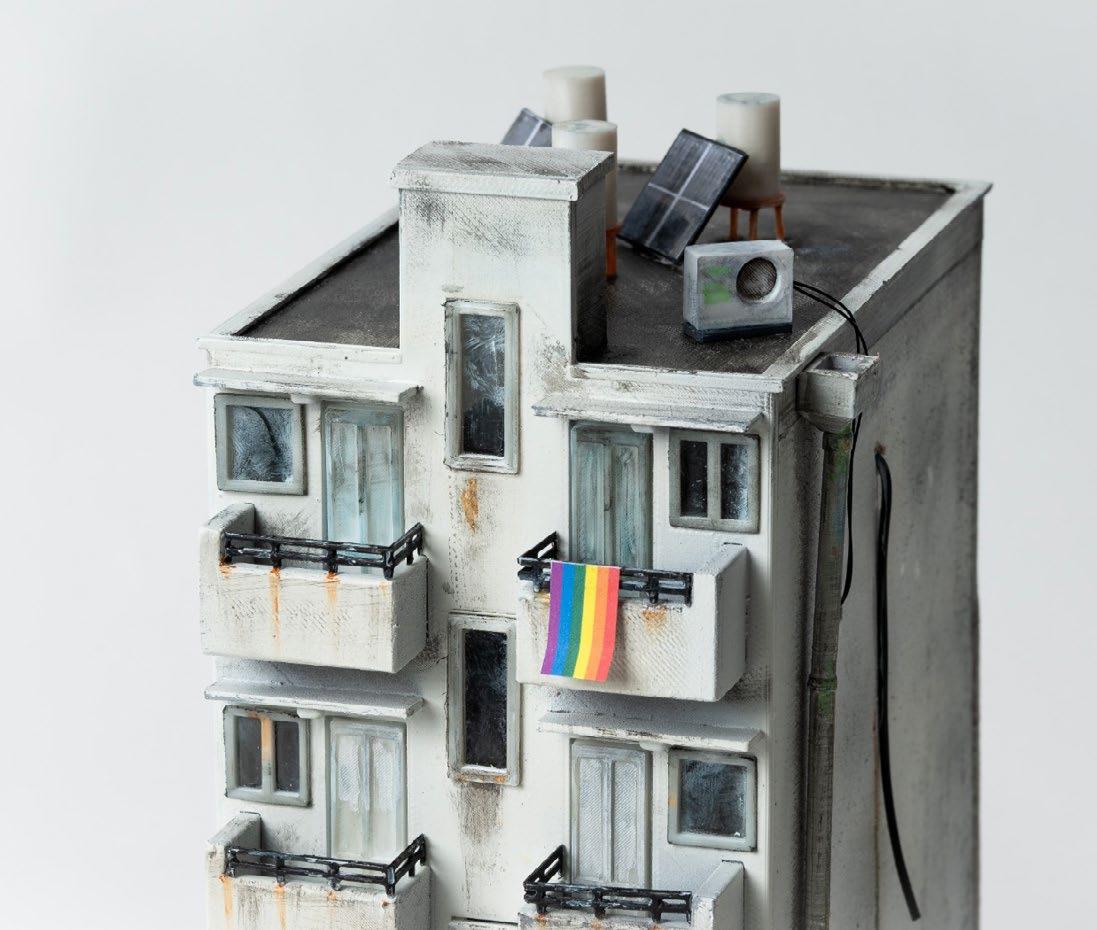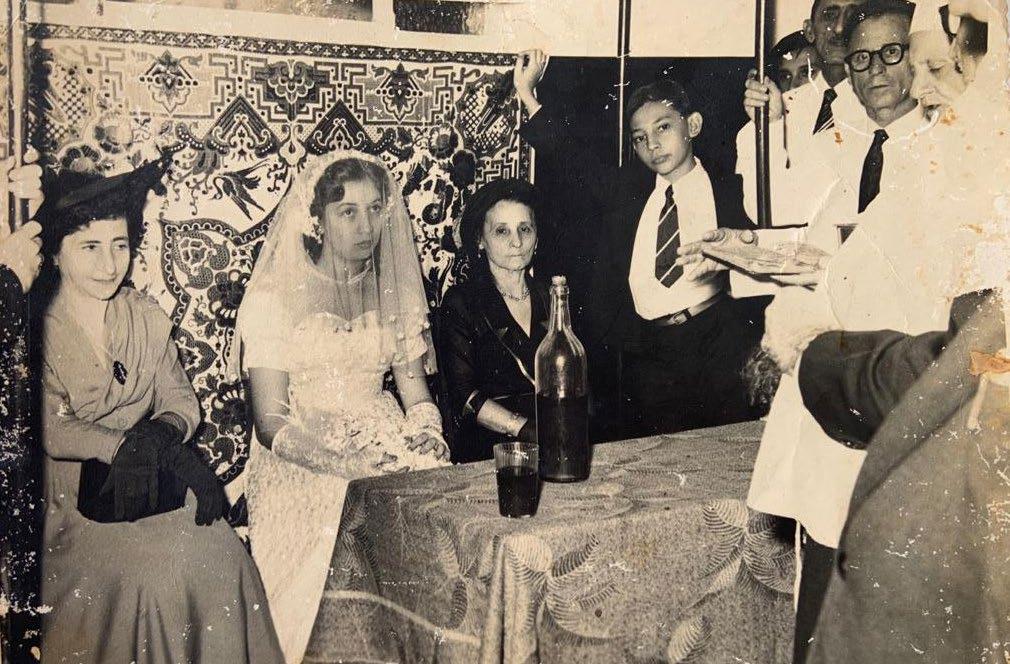
11 minute read
MAKING A DIFFERENCE: A CONVERSATION WITH MIRIT SULEMA AND STAV SHAFFIR
By Rebecca Grossman, Program Director, The David H. Sonabend Center for Israel
In today’s society, social change feels like an endeavor not worth undertaking. How can we really make a difference? To better understand how we can have an impact, I spoke with two incredible influencers, Mirit Sulema and Stav Shaffir.
Advertisement
Mirit Sulema is coordinator of the Dror Israel Urban Educators' Kibbutz in Akko. Stav Shaffir is a former member of the Knesset and founder of the Shira Center, a unique academy for young adults with autism and special needs. Both interviews, conducted separately, took place a week before the most recent Israeli elections.
My conversation with Stav Shaffir emphasized the need for universal activism in our systems. Our sense of empathy is key in building a movement to create change, which can then happen in a split second. We then must continue innovating on a local and more macro level. We must, as Mirit Sulema highlighted, constantly look around and ask “what is wrong, and what can I do to change it?” It’s like the story about saving one starfish, she said, “Saving just one doesn't do anything, but if everybody saves one starfish, we can help the entire shoreline back into the ocean.” Local actions do matter in creating a shared society, and eventually, all together, we can help all the starfish on the beach return to the ocean. Even if we can’t help all of them, our efforts can make a difference for each one.
Rebecca Grossman: Mirit, I would love to delve a little bit into the work you do at Dror Israel. Can you tell me more? What inspires you to do the work you do?
Mirit Sulema: One of the most shaping experiences I had as a teenager was going to Poland. There we learned about the rabble on the Warsaw Ghetto uprising, and it was pretty mind-blowing to realize that young people can change the world. One of the things that I learned during that educational process is to ask myself, what do I see around me? What do I like about it? What do I not like about it, and what can I do to fix it or to change it?
In my gap year before the army, I was in Gedera, in a house in an Ethiopian-only neighborhood. It was the first time I ever interacted with Ethiopian Jews, racism and poverty, things that you should see, that you should know and be aware of, and it was very shaping for me to see the society around me, to see how diverse Israeli society is, and how we have the opportunity to make it an inclusive society.
These experiences led me to continue my work with Dror Israel. Dror is a grassroots, national organization that works all over Israel. We have 16 kibbutzim, or educators’ communities, which are spread all over the country, with between 60 and 100 educators.
We have a youth movement, Hanoar HaOved v’HaLomed, which translates to the federation of working and studying youth, working towards peace and collaboration between different sectors of society. The youth movement has about 100,000 participants all over Israel with all the different sectors of society, such as Jews, Christians, Muslims, Druze, Bedouins, Russian-speaking people, Ethiopian immigrants, and Israeli Arabs. We also have a network of high schools for youths at risk, and two boarding schools and a pre-army school, some of which also offer a variety of occupational training tracks.
Our educational projects address challenges in society. For instance, in Sderot, our kibbutz has partnered with the municipality to offer activities and projects in the shelters with the kids, helping them with their posttrauma. In Mitzpe Ramon, the educators of the kibbutz, with the residents of the city, started a co-op for groceries, as an alternative to the high prices of the singular grocery store.
About four years ago, in 2018, we purchased a building in one of the most challenged and underserved neighborhoods in Akko, called Janusz Korczak. The ground floor is somewhat like a cultural center, with all kinds of programs and initiatives for the whole community. Akko is Israel's most mixed city, with the percentages of the population being the closest between Jews and Arabs.

RG: It's incredible work that Dror Israel does and that you’re doing in Akko. Stav, can you tell me about the work you are doing now, and what inspires you?
Stav Shaffir: I can start by telling you what I'm doing these days. I left politics about two years ago. I ended up sacrificing my own seat in order to stimulate the collaboration between the other politicians, labor and those on the left, to ensure they remained in the Knesset. I took a break from politics, just when we were in the beginning of the first pandemic lockdown here in Israel.

A lot of things at the same time started to change. Israel was continuing to go through this democratic crisis. The people who are hurt the most from this lack of stability are those who are the weakest in society. One of them is my own sister, who has autism and development problems. She’s a very big motive in everything I do in life. People who lack basic independence need constant care, and the community, the country or our society, to help them, with the right institutions, to be able to access education, jobs, and help in life. When COVID began, many of the very few things that she did have in her life also disappeared because the systems stopped functioning.
I decided it’s about time that I do something, especially for her and for people like her. She always had that passion to be a student, even though she can't read or write. She wanted to go to university, but there's no university that would accept her, and she can't go by herself.
So we decided to build one, called the Shira Center. It took us about a year to fundraise and build the first institution, and it was opened last March. It's inside a university. There are no fences or walls or anything that separate the special students from the neurotypical students. It's all open, but the special students get a special framework. They get education at the level that suits them. They get to work within the university facilities. They get a lot of help from volunteers in the university, and they have a whole therapeutic team that helps them in their day-to-day activities. The biggest thing is that they go to university feeling like real students, giving them an opportunity to feel meaningful in life. Now we're building more places like this. We have a huge demand, of course, because there's nothing. Everything you build is a spark of hope for so many people who can't find a place for their kids.
So I'm now working on building more places like that in other universities.
Sometimes I call our schools the empathy schools. The students with autism help teach empathy. By interacting with the students with autism, the students who go to the university for a regular degree get to learn what real sensitivity is.
That’s the biggest challenge of our society today. We’re losing that human value, the basis for everything. Sometimes we have empathy only for people from our own very close group. Empathy for others is the essence to have a democracy that is functioning and is the essence to have freedom.
RG: It’s incredible work that both of you do. It’s a steep endeavor to emphasize empathy and a shared society. I’m very curious, Stav, how were you able to get the support for this project, and beyond this project?
SS: The only way I know how to do things is by reaching out to the public and creating a movement around ideas. When we started the protest movements over a decade ago, we were a bunch of students who couldn't afford paying their rent. What we did was to move to live on the streets, to protest housing prices. The reason they succeeded and became a protest of a million people was because people joined. It was just a belief that something needs to be changed, along with a belief that in order for it to be changed, we have to take part. We have to physically be there.
When we started to build the Shira Center, my sister joined me and we started with a song to ask people to join her dream. When you come from real pain, you’re being very authentic and you are able to connect. It’s just about finding the right connection between your pain and somebody else’s pain and trying to reach out to solve it.

RG: It’s inspiring the amount of empowerment that you both have from your experiences and strength from your pain to then make that change that you see needs to happen in society. I’m curious if that leads into a larger theory of change, either from the grassroots or a more systemic level, or is it a mixture of the two?
MS: As a member of a youth movement, then as a member of Dror, I never felt like what I did was a little thing that I’m doing. I always met other people who do what I do in other places. So it’s a choice I made by myself to live the lifestyle that I live. If I do it in Akko with 80 other people, and someone is doing it in Ashkelon, someone in Sderot, someone in Carmiel and Haifa and Tel Aviv, in so many places, then it really feels like it has an impact.
So I can be involved in a very small-scale project, but knowing that Dror’s 1,500 educators are also involved in small-scale projects, all focused on a shared value of democracy and shared society, of peace and empowering others, then it's a lot of projects which can create a large impact, inspiring our students, and them carrying it to their society, their families, their workplaces, amongst their friends, in school, wherever. Sparking love in someone’s life can create a real change.

RG: I feel like that connects to Stav’s emphasis of empathy, really highlighting being able to recognize the humanity of the other and being vulnerable in that moment. I’m curious, Stav, how do you see a greater theory of change? Do you see that there is room for a change in the political system, or does change come from the grassroots up?
SS: I think we have to stop saying there is separation between these two systems. Politics is controlled by the people. It is controlled by what we do and how we act. If we organize, we can be efficient and effective politicians. Or create new ones to replace them. Voting is the least that you can do. The question is what you do next.
People expect much more from their democracies and democracies failed that hope, in a sense. We have to improve it and we have to constantly find new ways of doing it more efficiently. Closer to the people, to people’s streets and realities and basic services. And for that, people have to get more involved.
We need to activate people, so we need to look for ways to activate them, to make them feel that there is a reason to do it. Things can change in a minute, like what happened to us as students when it started, when we started to organize a protest movement. The minute of change comes like that, in a split second, but it comes after a lot of effort. There is no success story in politics or business that really succeeded in one attempt. You have to try and try and try and go through a lot of pain to see something really changed. But it will definitely not change if you won’t try.
What I’m trying to to do now, outside of my work at the Shira Center, is to collaborate with people from all around the world who are dealing with the future of democracy and try to figure out ways to do this new activism, to make citizens feel more empowered, to educate them about ways of making influence.
RG: The majority of the population does seem fairly silent and inactive, but that’s where the fruit of our efforts need to be put to create an active democracy across a variety of societies. Is there any area or handful of areas that you feel would activate the majority of people?
SS: I think a lot of it is about being closer to people’s basic needs. Sometimes politics and political discourse escapes that. It goes deep into theory and forgets about real, day-today lives. I’m a very strong believer also in what we can do locally, like how we can be effective in everything that we do and how we can affect our own environment.
We have to make democracy interesting, full of imagination and creativity. We think about it for startups, but we don’t think about the most important startup in our life, which is how our very own lives, resources, and security are being controlled. We need to start integrating this system. The public, the street movement, life and politics, they are combined and always affect each other.
Israel, for example, has this genius startup industry with so much creativity and ability to solve the world’s biggest problems. I want to see the same minds trying to think about how we change our politics and how we change and improve our democracy. Even just for an hour a week. Everyone can find an hour a week to do something for their country.
RG: The reframing of the idea of innovation with regard to democracy will hopefully attract people who wouldn't typically want to be involved in politics and bring in some new and engaging ideas for our societies.
I’m curious, Mirit, how do you come up with new initiatives? It seems you and your fellow Dror educators are creating the innovative social changes that Stav is mentioning. How do you narrow in on the few things that are most important?
MS: Our dreams come from our educators, and I like to say that we are an organization for fulfilling dreams, usually on a very local basis. Some educator decides he has a passion towards something, he has a new idea, or sees something that he feels bad about and wants to address or tackle. And then they start an idea, and the financial team tries to help to get the funds for it. There’s a lot of new initiatives in a year. Maybe it will fail and we will learn from the failure. Maybe it will succeed, and we’ll learn from the success.
I think that youth movements are very inherent to the Israeli narrative and idea. Through a youth movement you can meet someone who’s different from you, just like I did when I met Ethiopian kids when I was working with the youth movement. I think it’s important for kids and youth in Israel to meet someone different from them with a counselor or guide, or with someone who gives them the tools to practice a good encounter. This is what we’re trying to do: get the kids, the youth, the elderly, the adults, to meet each other, and to collaborate and to think, how do we want Akko to look? How do we want Akko to be? And then work towards that. Once you collaborate with someone different than you, then you’re able to, and want to, try to picture a better world or a better city with them.
Then you’re automatically bound to the same belief; you understand that you’re tied. Your destiny is tied together. That is something we need more in Israeli society. More people meeting each other, seeing how they can collaborate and work together toward a better society, and not sectorizing and only taking care of themselves.
RG: Breaking down those boundaries between “us” and “them” and recognizing that we are all people is very powerful. We usually have very similar needs, desires, daily life struggles, and must recognize that we should be in a shared society helping each other, supporting each other, and we can all lift each other up. If we could bring that form of deep empathy and innovation to our daily lives and to our engagement with our political systems and societies, that could be really empowering.
Read the full interview with Stav Shaffir here.
Read the full interview with Mirit Sulema here.

